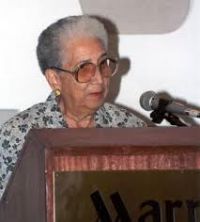Antonia Pantoja
Contents
Country
Puerto Rico
Birth - Death
1922 - 2002
Occupation
Activist
Notable Achievements
Presidential Medal of Freedom
Description
Dr. Antonia Pantoja was a social activist and educator who is directly responsible for advancing the rights of the Spanish-speaking community in the United States and elsewhere. Her particular focus was on education and the needs of disadvantaged children. In the process, she became a role model for the Spanish community, the feminist community, and the LGBTQ community.
Born in Puerto Rico to a poor family, Pantoja realized at an early age the importance of education to escaping poverty. She obtained her Master’s degree in Sociology from Columbia University in 1954 with the financial assistance from her extended family and friends. Pantoja immediately became active in issues around youth and Hispanics when she founded HAYA (Hispanic American Youth Association) to address the challenges of poverty and education in this marginalized group. This organization is now known as the National Puerto Rican Forum. Pantoja became an early proponent of bilingual education for Hispanic youth in America.
To achieve this goal, Pantoja’s founded the organization ASPIRA (Aspire), a charitable group which promotes a positive self image and sense of community for the Hispanic population. At the time of its formation, 70 percent of Puerto Rican families lived below the poverty line.
Prior to ASPIRA, there was no national organization that brought together Hispanic artists, writers, business people, and youth to engender a sense of importance and commitment. For example, at that time, only 28 of 179,000 Hispanic students in high school went on to colleges. Today, ASPIRA provides college counselling and aid to students and has grown to be the largest non-profit agency of its kind for the Latino community in the world.
In 1972, ASPIRA filed a lawsuit against New York State to demand a bilingual option for Latino school students. This lead to a consent decree, considered a landmark occasion for the community. Her efforts were driven by her childhood experience of being forced to study in English in Puerto Rico, a language that was foreign to the indigenous population.
As other states quickly followed, the result was a ground-breaking precedent for advancing equal opportunity and educational rights throughout the United States.
To advance her educational cause, Pantoja founded Boricua College in 1970 which now comprises three campuses in New York City. She joined the faculty of San Diego’s School of Social Work in 1978 and founded the Graduate School for Community Development.
Today, ASPIRA is credited with developing a new and confident generation of Hispanic leaders. Such outstanding individuals as Anthony Romero, Cuda Alvarez, Nelson Diaz, and Jimmy Smits have all benefitted from the program. In 1996, President Bill Clinton awarded Pantoja the Presidential Medal of Freedom, the nation’s highest civilian honour, being the first Puerto Rican woman to receive the honour.
In her autobiography Memoir of a Visionary: Antonio Pantuja (2002), she discusses her lesbianism in detail. She regretted not having been public about her sexual orientation before then, but argues that her focus on the rights of the Hispanic community simply took precedence given the environment of the time. She has subsequently become a role model for the Latino LGBTQ community around the world.
Pantujo was constantly focussed on her self-identity as a woman, as an Hispanic, and as a member of the LGBTQ community – all treated as marginalized communities during her lifetime. She dared to challenge the establishment on issues of language, poverty, and education. Pantujo broke the ethnic and gender barriers of her time and created new standards for women, children, Hispanics, and also for the LGBTQ community. Her efforts were based on her belief that all members of society should be encouraged to achieve their potential.
See Also
- LGBTQ Recipients of the Presidential Medal of Freedom
- LGBTQ Founders and Executives with Charitable Foundations
- LGBTQ Individuals in the Fields of Sociology and Anthropology
- School Teachers, Researchers and Education Staff Who Identify as LGBTQ

